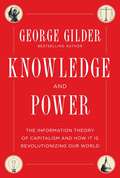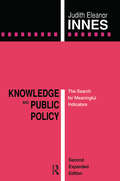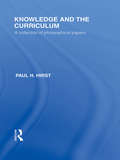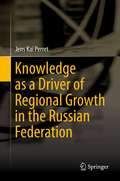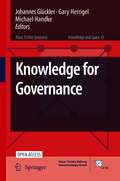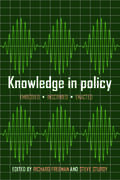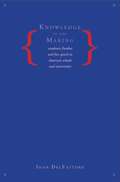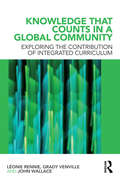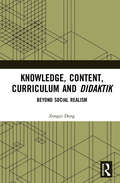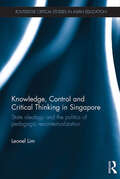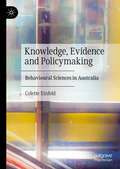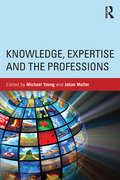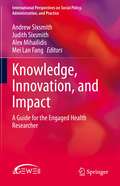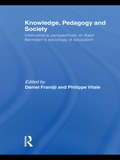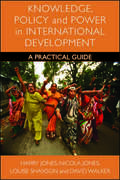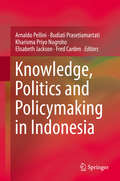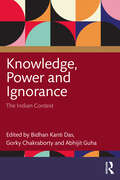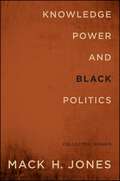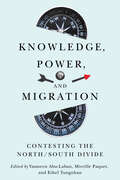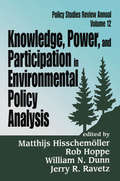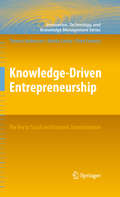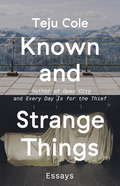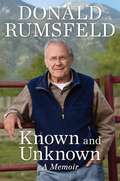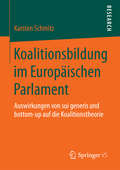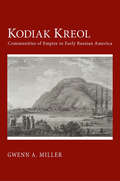- Table View
- List View
Knowledge and Power: The Information Theory of Capitalism and How it is Revolutionizing our World
by George GilderRonald Reagan's most-quoted living author - George Gilder - is back with an all-new paradigm-shifting theory of capitalism that will upturn conventional wisdom, just when our economy desperately needs a new direction.America's struggling economy needs a better philosophy than the college student's lament: "I can't be out of money, I still have checks in my checkbook!" We've tried a government spending spree, and we've learned it doesn't work. Now is the time to rededicate our country to the pursuit of free market capitalism, before we're buried under a mound of debt and unfunded entitlements. But how do we navigate between government spending that's too big to sustain and financial institutions that are "too big to fail?" In Knowledge and Power, George Gilder proposes a bold new theory on how capitalism produces wealth and how our economy can regain its vitality and its growth.Gilder breaks away from the supply-side model of economics to present a new economic paradigm: the epic conflict between the knowledge of entrepreneurs on one side, and the blunt power of government on the other. The knowledge of entrepreneurs, and their freedom to share and use that knowledge, are the sparks that light up the economy and set its gears in motion. The power of government to regulate, stifle, manipulate, subsidize or suppress knowledge and ideas is the inertia that slows those gears down, or keeps them from turning at all.One of the twentieth century's defining economic minds has returned with a new philosophy to carry us into the twenty-first. Knowledge and Power is a must-read for fiscal conservatives, business owners, CEOs, investors, and anyone interested in propelling America's economy to future success.
Knowledge and Public Policy: The Search for Meaningful Indicators
by Judith Eleanor InnesThis book addresses the question of what it takes to develop social indicators that genuinely influence important public decisions. It looks historically at the processes of creating and using three important social indicators in the United States: unemployment rates, standard budgets, and crime rates. It then develops principles f
Knowledge and the Curriculum (International Library of the Philosophy of Education Volume 12): A Collection of Philosophical Papers
by Paul H. HirstThe papers in this volume provide a coherent philosophical study of a group of important and pressing educational issues such as the selection of objectives for less able children, the fundamental characteristics of teaching and the integration of the curriculum. A thesis on the necessary differentiation of knowledge into logically distinct forms is outlined, and is defended against recent philosophical criticisms. Its implications for curriculum planning are examined, with particular reference to the urgent problems of adeqately characterizing liberal education and those forms of moral and religious education that are appropriate in maintained schools.
Knowledge as a Driver of Regional Growth in the Russian Federation
by Jens Kai PerretThe Russian Federation has a history of more than twenty years of transformation to a market economy, but as well to a knowledge society, to look back on. This study takes a look at the knowledge generation, knowledge transmission and knowledge use inside the Federation since the early 1990s. Furthermore, in light of the high dependence of the Russian economy on the oil and gas sectors this study analyzes the impact knowledge related factors have on regional income generation following thereby in the direction of Schumpeterian growth theory. The study combines descriptive with empirical analyses to paint a picture as detailed as possible of the Russian knowledge society and its innovative potential.
Knowledge for Governance (Knowledge and Space #15)
by Johannes Glückler Gary Herrigel Michael HandkeThis open access book focuses on theoretical and empirical intersections between governance, knowledge and space from an interdisciplinary perspective. The contributions elucidate how knowledge is a prerequisite as well as a driver of governance efficacy, and conversely, how governance affects the creation and use of knowledge and innovation in geographical context. Scholars from the fields of anthropology, economics, geography, public administration, political science, sociology, and organization studies provide original theoretical discussions along these interdependencies. Moreover, a variety of empirical chapters on governance issues, ranging from regional and national to global scales and covering case studies in Australia, Europe, Latina America, North America and South Africa demonstrate that geography and space are not only important contexts for governance that affect the contingent outcomes of governance blueprints. Governance also creates spaces. It affects the geographical confines as well as the quality of opportunities and constraints that actors enjoy to establish legitimate and sustainable ways of social and environmental co-existence.
Knowledge in Policy: Embodied, Inscribed, Enacted
by Richard Freeman and Steve SturdyThis important collection presents a radical reconception of the place of knowledge in contemporary policymaking in Europe, based not on assumptions about evidence, expertise or experience but on the different forms that knowledge takes. Knowledge is embodied in people, inscribed in documents and instruments, and enacted in specific circumstances. Empirical case studies of health and education policy in different national and international contexts demonstrate the essential interdependence of different forms and phases of knowledge. They illustrate the ways in which knowledge is mobilised and resisted, and draw attention to key problems in the processing and transformation of knowledge in policy work. This novel theoretical framework offers real benefits for policymakers, academics in public policy, public administration, management studies, sociology, education, public health and social work, and those with a practical interest in education and health and related fields of public policy.
Knowledge in the Making: Academic Freedom and Free Speech in America's Schools and Universities
by Joan DelfattoreHow free are students and teachers to express unpopular ideas in public schools and universities? Not free enough, Joan DelFattore suggests. Wading without hesitation into some of the most contentious issues of our times, she investigates battles over a wide range of topics that have fractured school and university communities--homosexuality-themed children's books, research on race-based intelligence, the teaching of evolution, the regulation of hate speech, and more--and with her usual evenhanded approach offers insights supported by theory and by practical expertise. Two key questions arise: What ideas should schools and universities teach? And what rights do teachers and students have to disagree with those ideas? The answers are not the same for K-12 schools as they are for public universities. But far from drawing a bright line between them, DelFattore suggests that we must consider public education as a whole to determine how--and how successfully--it deals with conflicting views. When expert opinion clashes with popular belief, which should prevail? How much independence should K-12 teachers have? How do we foster the cutting-edge research that makes America a world leader in higher education? What are the free-speech rights of students? This uniquely accessible and balanced discussion deserves the full attention of everyone concerned with academic goals and agendas in our schools.
Knowledge that Counts in a Global Community: Exploring the Contribution of Integrated Curriculum
by John Wallace Léonie J. Rennie Grady VenvilleAs the third millennium progresses, we are faced with increasing pressures relating to climate change and the sustainability of life on Earth. Concerned citizens are realizing that the responsibility to respond is both local and global. There is an increasing sense of urgency about the need to reform the processes of schooling and curriculum to better prepare students for global citizenship. Educators, policy makers and the wider community are seeking information about how to proceed with this reform effort, particularly how alternative and integrated approaches to curriculum can be used to engage students with the important issues of our time. Knowledge that Counts in a Global Community explores the potential contribution of curriculum integration in a context where school curricula are typically segregated by discipline. It offers curriculum integration as a powerful tool for educating young citizens so that they can understand and respond to global concerns. It argues for an informed citizenry who can think broadly across disciplines, and contribute sensibly and pragmatically to local problems with an eye on how this translates to making a global difference. In its examination of the twin themes of global knowledge and curriculum integration, the book explores: the nature of curriculum integration the nature of knowledge the nature of learning The authors reflect on these issues from perspectives gained by more than a decade of research in the area. Their in-depth, scholarly exploration and critical analysis of current approaches to curriculum, introduces educators and academics to contemporary ways of conceptualizing the complexities of, and relationships among curriculum integration, knowledge and learning. Throughout the book, the authors emphasize the central curriculum question, what kinds of outcomes do we want for students of the twenty-first century? This book will provide a valuable resource for academic educators, researchers, teachers and others interested in educational policy reform.
Knowledge, Content, Curriculum and Didaktik: Beyond Social Realism
by Zongyi DengBringing to bear a wealth of literature from curriculum theory, Didaktik, philosophy of education and teacher education, this book broadens and enriches the conversation initiated by Michael Young and his colleagues on 'bringing knowledge back in' (Young, 2007). Knowledge, Content, Curriculum and Didaktik is distinctive in providing a comprehensive and multifaceted analysis of the role of knowledge, and in particular curriculum content, in relation to curriculum policy, curriculum planning and classroom teaching. It makes a case for linking knowledge and content to the development of human powers or capabilities needed for the 21st century and unpacks the challenges for curriculum policy, curriculum planning and classroom teaching. The book discusses, among other issues: Educational aims and theories of knowledge School subjects and academic disciplines: differences and relationships School subjects and theories of content Understanding the content for teaching The book will be relevant for scholars, researchers, policy makers and curriculum developers who seek a more sophisticated, more balanced and philosophically better grounded understanding of the role of knowledge and content in education and curriculum.
Knowledge, Control and Critical Thinking in Singapore: State ideology and the politics of pedagogic recontextualization (Routledge Critical Studies in Asian Education)
by Leonel LimThis book examines how critical thinking is regulated in Singapore through the process of what the influential sociologist of education Basil Bernstein termed "pedagogic recontextualization". The ability of critical thinking to speak to alternative possibilities and individual autonomy as well as its assumptions of a liberal arrangement of society is problematized in Singapore’s socio-political climate. By examining how such curricular discourses are taken up and enacted in the classrooms of two schools that cater to very different groups in society, the book foregrounds the role of traditional high-status knowledge in the elaboration of class formation and develops a critical understanding of post-developmental state initiatives linked to the parable of modernization in Singapore. Knowledge, Control and Critical Thinking in Singapore offers chapters on:• Critical Thinking and the Singapore State: Meritocracy, Illiberalism and Neoliberalism • Sacred Knowledge and Elite Dispositions: Recontextualizing Critical Thinking in an Elite School• Power, Knowledge and Symbolic Control: Official Pedagogic Identities and the Politics of Recontextualization This book will appeal to scholars in comparative education studies, curriculum studies and education reform. It will also interest scholars engaged in Asian studies who are struggling to understand issues of education policy formation and implementation, particularly in the areas of critical thinking and other knowledge skills.
Knowledge, Evidence, and Policymaking: Behavioural Sciences in Australia
by Colette EinfeldThis book provides an insightful and nuanced account of the roles of knowledge and evidence in behavioural science practices. Utilising evidence from Australia, it draws together the fields of evidence-based policymaking and behavioural insights in order to examine how policy actors negotiate the use of scientific evidence, knowledge, lived experience, and ethics in policymaking. It also considers the ways in which different knowledges can &‘compete&’ in public policy, and the roles of policymakers in that competition. Offering insights for both evidence-based policy processes and the application of behavioural insights more generally, the book is a valuable resource for academics and practitioners interested in behavioural sciences, and the impact of different types of evidence in policymaking.
Knowledge, Expertise and the Professions
by Michael Young Johan MullerIt has long been recognised that specialised knowledge is at the core of what distinguishes professions from other occupations. The privileged status of professions in most countries, however, together with their claims to autonomy and access to specialised knowledge, is being increasingly challenged both by market pressures and by new instruments of accountability and regulation. Established and emerging professions are increasingly seen as either the solution, or as sources of conservatism and resistance to change in western economies, and recent developments in professional education draw on a competence model which emphasises what newly qualified members of a profession ‘can do’ rather than what ‘they know’. This book applies the disciplines of the sociology of knowledge and epistemology to the question of professional knowledge. What is this knowledge? It goes beyond traditional debates between ‘knowing how’ and ’knowing that’, and ‘theory’ and ‘practice’. The chapters cover a wide range of issues, from discussions of the threats to the knowledge base of established professions including engineers and architects, to the fraught situations faced by occupations whose fragile knowledge base and professional status is increasingly challenged by new forms of control. While recognising that graduates seeking employment as members of a profession need to show their capabilities, the book argues for reversing the trend that blurs or collapses the skill/knowledge distinction. If professions are to have a future then specialised knowledge is going to be more important than ever before. Knowledge, Expertise and the Professions will be key reading for students, researchers and academics in the fields of professional expertise, further education, higher education, the sociology of education, and the sociology of the professions.
Knowledge, Innovation, and Impact: A Guide for the Engaged Health Researcher (International Perspectives on Social Policy, Administration, and Practice)
by Andrew Sixsmith Judith Sixsmith Alex Mihailidis Mei Lan FangThis book provides researchers with a straightforward and accessible guide for carrying out research that will help them to combine good science with real-world impact. The format of this book is simple: concise chapters on key topics, examples and case studies, written in plain language that will guide researchers through the process of research-driven innovation. The book draws on the editors’ experience in leading the Age-Well Network of Excellence. The aim of Age-Well is to drive innovation in the area of technology and aging. Researchers often lack the knowledge and abilities to commercialize or mobilize the outcomes of their research. Moreover, there is a lack of training and education resources suitable for the wide range of disciplines and experience that are becoming more typical. The book emphasizes the practicalities of “how to” undertake the kinds of activities that researchers should be engaging in if they are serious about achieving impact. Overall, this book will guide researchers through the process of research-driven innovation.
Knowledge, Pedagogy and Society: International Perspectives on Basil Bernstein's Sociology of Education
by Daniel FrandjiOver the course of the late-twentieth century Basil Bernstein pioneered an original approach to educational phenomena, taking seriously questions regarding the transmission, distribution and transformation of knowledge as no other before had done. Arguing tirelessly for change, more than any other British sociologist it is Bernstein who presents to us education as a social right and not as a privilege. It is this objective today that makes his work so important. Knowledge, Pedagogy and Society seeks to clarify the broad brushstrokes of his theories, developed over the span of more than forty years, by collecting together scholars from every corner of the globe; specialists in education, sociology and epistemology to test and examine Bernstein’s work against the backdrop of their own research. From teaching content and the social, cognitive and linguistic aspects of education, to changes in the political climate in the early twenty-first century, this collection represents an open dialogue with Bernstein’s work using a forward-looking and dynamic approach. Originally published in French with the explicit aim of locating Basil Bernstein’s theories alongside those of Pierre Bourdieu, one of the most important European sociologists, the French editors draw together a collection that offers a diverse background and perspective on Bernstein’s work and thought. Revised to include a new preface, a new introduction and revisited papers, the English edition will be a relevant resource for anyone interested in Bernstein, his reception and importance, as well as individuals working in the sociology of education, theory of education and education policy.
Knowledge, Policy and Power in International Development: A Practical Guide
by Harry Jones Nicola A. JonesThis book presents an academically rigorous yet practical guide to efforts to understand how knowledge, policy and power interact to promote or prevent change.It offers a power analysis perspective on the knowledge-policy process, illustrated with rich empirical examples from the field of international development, combined with practical guidance on the implications of such an approach. It provides ways to identify and address problems that have hampered previous attempts to improve the space between knowledge and policy; such as difficulties in analysing political context, persistent asymmetric relationships between actors, ignorance of the contributions of different types of knowledge, and misconceptions of the roles played by intermediary organisations. Most importantly, the book gives readers the ability to develop strategies for negotiating the complexity of the knowledge-policy interface more effectively, so as to contribute to policy dialogues, influence policy change, and implement policies and programmes more effectively.The authors focus on the dynamics of the knowledge-policy interface in international development; offering novel theoretical insights and methodological approaches that are applicable to a broader array of policy arenas and their audiences, including academics, practitioners and students.
Knowledge, Politics and Policymaking in Indonesia
by Arnaldo Pellini Budiati Prasetiamartati Kharisma Priyo Nugroho Elisabeth Jackson Fred CardenThis edited volume examines key questions about evidence-informed policymaking in Indonesia. It draws on insights and evidence acquired through the implementation of the Knowledge Sector Initiative, a donor-funded programme that aims to increase the demand for and use of evidence in policymaking in Indonesia. Featuring contributions from academics, policy researchers, policymakers and development practitioners, the volume will deepen readers’ understanding of how knowledge and politics shape the policymaking process in Indonesia. As such, it will be of interest to Indonesian and international researchers, academics, students, practitioners and policymakers concerned with various aspects of evidence-informed policymaking research and processes. In particular, regional and international development practitioners and development partners interested in learning from Indonesia’s efforts to improve how evidence is used to address key development challenges will find this volume valuable.
Knowledge, Power and Ignorance: The Indian Context
by Abhijit Guha Gorky Chakraborty Bidhan Kanti DasWhat is knowledge, and ignorance? How is it decided? Do power and power relations influence this process? Does the spread of knowledge lead to more ignorance? Is ignorance socially produced? Is knowledge always socially contextualized? This book deals with these important questions on the interplay of knowledge, ignorance and power located in varied contexts in India.As systematic knowledge grows, so does the possibility of ignorance. Ignorance is a state which people attribute to others and is loaded with moral judgment. Thus, being underdeveloped often ‘implies a kind of stupidity or failure’. This volume seeks to be premised in a framework where ignorance is understood as being a socially produced and maintained phenomenon, where the ways of knowing and not knowing are interdependent. It is a novel attempt for an academic re-orientation of the Knowledge–Ignorance paradigm through a process of re-interpretation of the bounded purview attached with the existing epistemological understandings. It focuses on concrete case studies, often with an ethnographic stint. The volume critically looks at various aspects: Epistemological Issues; Understanding Community Perspectives and the State; Natural Resources, Power and Ignorance; Media and Production of Non-Knowledge; and other emerging areas. Each essay bears a striking similarity – that of understanding the complex processes and dynamics of the production of ignorance in a field of commonly held beliefs of 'knowledge' - be it scientific, societal, religious, magical or political - through the overarching realm of power.This interdisciplinary volume will be of interest to a cross-section of academics and students of sociology, social anthropology, political science, human geography, history, public policy and development studies.
Knowledge, Power, and Black Politics: Collected Essays (SUNY series in African American Studies)
by Mack H. JonesFew scholars have influenced the development of the study of black politics as much as Mack H. Jones. Through his writings one can trace the emergence, evolution, and maturation of the scientific study of the field. Knowledge, Power, and Black Politics brings together difficult-to-find and out-of-print essays by this important figure. In the first part of this volume Jones demonstrates how American social science creates a misleading caricature of African American life, one that can only lead to misguided public policies. He offers an alternative frame of reference, the dominant-subordinate group model, and argues that it offers greater descriptive insights and prescriptive utility for those interested in understanding politics internal to the African American community. The framework established in the first section is used to examine a broad range of topics such as the history of black politics from the period of enslavement to the modern era and the dynamics of the civil rights movement, as well as a range of contentious public policy issues, including public welfare, affirmative action, the black underclass, racism and multiculturalism, the black conservative movement, deracialization, presidential politics, and US foreign policy toward developing countries.
Knowledge, Power, and Migration: Contesting the North/South Divide (McGill-Queen's Refugee and Forced Migration Studies)
by Ethel Tungohan Yasmeen Abu-Laban Mireille PaquetAs the field of migration studies has grown, the asymmetrical relationship between researchers in the Global North and in the South has produced a body of work that centres the concerns of the former. Those from the Global North and wealthier countries continue to produce the greater portion of this research, while research from Global South scholars with lived experiences as migrants is received as anecdotal or too niche to have universal application.Knowledge, Power, and Migration assembles researchers from across the divide to question the ways in which research practices can change the conversation on immigration. It encourages a necessary curiosity about how scholarship in the field can shape global, social, and epistemic justice. Migration is a constant in human history, but the sharp decline in permanent resettlement options, increasingly selective criteria, and violent enforcement measures of the twenty-first century constitute a crisis of immigration policy. Only by redressing the inequalities it shares with global governance structures can the discipline confront this historic challenge.Research on immigration can occasion reflections and practices that challenge epistemic injustices. Knowledge, Power, and Migration contributes to this ongoing project while offering insights on the practical organization of new forms of dialogue on migration in a largely unequal world.
Knowledge, Power, and Participation in Environmental Policy Analysis
by Rob HoppeThis volume probes practical dilemmas and competing re- search perspectives in environmental policy analysis. Scholars working in different fields, research traditions, societies, and policy domains offer significant insights into the processes and consequences of environmental policy making.Part 1, "Coping with Boundaries," describes present-day conflict between experts and greater public participation in environmental policy. It shows that the institutionalization of increasingly complex environmental problems has led to a conflict between technocracy and democracy. Part 2, "The Transnational Challenge," examines modes of cooperation between grassroots movements, scientists, and regional authorities in the United States and Canada. These and other modes of cooperation laid the foundations for the Great Lakes Water Quality Agreement, increased the effectiveness of air pollution treaties, and increased climate change. Part 3, "Bio-Hazards: Policies and Paralysis," deals with environmental prob-lems closest to the everyday concerns of the public at large because they have immediate implications for food safety and other values. Part 4, "The Citizens' Perspective," focuses on citizen vis-a-vis environmental policy, noting that in order to make policies work citizens must be willing and able to participate in policy-making and cooperate in implementing environmental choices. Part 5, "Confronting Ordinary and Expert Knowledge," explores opportunities and constraints affecting public participation in evaluation of science. Part 6, "Developments in Research Programming," addresses such questions as whether scientists still have opportunities to do the research they want without being interrupted or disturbed by policy makers and other stakeholders. Part 7, "Policy Sciences' Aspirations," explores different avenues for improving environmental policy.Volume twelve in the PSRA series should inspire further investigations of the relations among knowledge, power, and participation in environmental policy. It will be of timely interest to environmentalists, policy-makers, scholars, and the general public.
Knowledge-Driven Entrepreneurship
by Piero Formica Martin G. Curley Thomas AnderssonThe current economic era, characterized by the rapid and global dissemination of information and capital, has been called the "knowledge age," the "entrepreneurial society," and the "intangibles economy," among other labels. Technological and productivity improvements continue to shift the emphasis from the mastery of physical assets (e.g., natural resources, factories) and physical tools (e.g., machines) to that of intangible assets (e.g., education, R&D projects, brands, patents) and socio-cultural tools (e.g., communities of knowledge practice) as the key to a community's economic prosperity. The purpose of this book is to build a bridge between knowledge and entrepreneurship, which have traditionally been separated by the walls of academic disciplines. Building on the pioneering work of Peter Drucker and William Baumol, the authors explore the intricate relationships among knowledge generation, innovation, new business creation, and the institutions that support them. Demonstrating direct links between the flow and application of knowledge, innovations in products and processes, the development of new enterprises, and generation of economic wealth, the authors strongly argue that these assets must be protected and sustained through national and regional institutions that encourage creativity and experimentation. Employing illustrative examples from around the world, the authors focus on the crucial role of societies to educate and support entrepreneurs and establish the right environment for new business development and rapid conversion of ideas into enterprises that contribute to economic growth and prosperity.
Known and Strange Things: Essays
by Teju ColeA blazingly intelligent first book of essays from the award-winning author of Open City and Every Day Is for the Thief With this collection of more than fifty pieces on politics, photography, travel, history, and literature, Teju Cole solidifies his place as one of today's most powerful and original voices. On page after page, deploying prose dense with beauty and ideas, he finds fresh and potent ways to interpret art, people, and historical moments, taking in subjects from Virginia Woolf, Shakespeare, and W. G. Sebald to Instagram, Barack Obama, and Boko Haram. Cole brings us new considerations of James Baldwin in the age of Black Lives Matter; the African American photographer Roy DeCarava, who, forced to shoot with film calibrated exclusively for white skin tones, found his way to a startling and true depiction of black subjects; and (in an essay that inspired both praise and pushback when it first appeared) the White Savior Industrial Complex, the system by which African nations are sentimentally aided by an America "developed on pillage." Persuasive and provocative, erudite yet accessible, Known and Strange Things is an opportunity to live within Teju Cole's wide-ranging enthusiasms, curiosities, and passions, and a chance to see the world in surprising and affecting new frames.
Known and Unknown: A Memoir
by Donald RumsfeldRumsfeld addresses the challenges and controversies of his career, from the unseating of the entrenched House Republican leader in 1965, to helping the Ford administration steer the country away from Watergate and Vietnam, to bruising battles over transforming the military for the 21st century, to the war in Iraq, to confronting abuse at Abu Ghraib and allegations of torture at Guantanamo Bay.
Koalitionsbildung im Europäischen Parlament: Auswirkungen von sui generis und bottom-up auf die Koalitionstheorie
by Karsten SchmitzKarsten Schmitz untersucht systematisch die Mehrheitsbildung im Europäischen Parlament in der sechsten Legislaturperiode im Mitentscheidungsverfahren, dem heutigen ordentlichen Gesetzgebungsverfahren. Daraus ergeben sich neue Erkenntnisse für die Koalitionstheorie jenseits von parlamentarischen Regierungssystemen, eine differenziertere Auswertung der Mehrheitsbildung als bei Simon Hix und ein starker Einblick in die Binnenstrukturen des Parlaments. Dabei wird die Mehrheitsbildung in allen Gesetzgebungsverfahren zunächst in einem quantitativen Datensatz dargestellt und anschließend in ausgewählten Fallbeispielen vertiefend untersucht.
Kodiak Kreol: Communities of Empire in Early Russian America
by Gwenn A. MillerFrom the 1780s to the 1820s, Kodiak Island, the first capital of Imperial Russia's only overseas colony, was inhabited by indigenous Alutiiq people and colonized by Russians. Together, they established an ethnically mixed "kreol" community. Against the backdrop of the fur trade, the missionary work of the Russian Orthodox Church, and competition among Pacific colonial powers, Gwenn A. Miller brings to light the social, political, and economic patterns of life in the settlement, making clear that Russia's modest colonial effort off the Alaskan coast fully depended on the assistance of Alutiiq people. In this context, Miller argues, the relationships that developed between Alutiiq women and Russian men were critical keys to the initial success of Russia's North Pacific venture. Although Russia's Alaskan enterprise began some two centuries after other European powers--Spain, England, Holland, and France--started to colonize North America, many aspects of the contacts between Russians and Alutiiq people mirror earlier colonial episodes: adaptation to alien environments, the "discovery" and exploitation of natural resources, complicated relations between indigenous peoples and colonizing Europeans, attempts by an imperial state to moderate those relations, and a web of Christianizing practices. Russia's Pacific colony, however, was founded on the cusp of modernity at the intersection of earlier New World forms of colonization and the bureaucratic age of high empire. Miller's attention to the coexisting intimacy and violence of human connections on Kodiak offers new insights into the nature of colonialism in a little-known American outpost of European imperial power.
